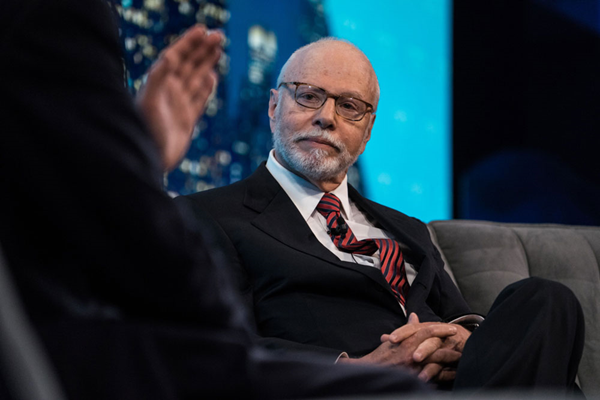|

|

Michelle
Celarier
|
PORTFOLIO
Paul Singer’s Elliott Is a ‘Risk’ to
Pension Funds, Union Report Argues.
A new study says the hedge fund underperforms, and so do its
activist targets.
September 21, 2021 |

Paul Singer (Misha Friedman/Bloomberg) |
Paul
Singer’s Elliott Management has a fearsome reputation that has turned
it into a $48 billion behemoth. But the hype surrounding the firm
doesn’t match its results, according to a new report by
the Communications Workers of America and the SOC Investment Group.
The SOC Investment Group works with pension funds sponsored by unions
affiliated with the Strategic Organizing Center, a coalition of four
unions representing more than four million members with more than $250
billion in assets under management.
Not only is Elliott’s hedge fund an underperformer, so are the
companies that its activism targets, the report claimed.
The CWA’s report, “Activist Hedge Fund Risks to Pension Funds,” has a
simple message to pension funds: “The negative long-term effect
Elliott and other activist hedge funds have on public companies may
dwarf any benefit pension funds receive as a limited partner.”
In 2021, Singer made Institutional Investor’s coveted Rich
List, earning $675 million in 2020, ranking 19th. Elliott’s flagship
fund earned more than 13 percent for the full year, while the Standard
& Poor’s 500 gained 18.4 percent during the same time period.
Whatever Singer’s standing among hedge fund honchos, the report noted
that over the past several years, Elliott has underperformed both the
S&P 500 and a 60-40 blend of stock and bond investments. As of March
31, over the prior 12 months Elliott gained 14.78 percent net of fees,
while the S&P 500 gained 56.35 percent, and a 60-40 blend rose 31.67
percent, the report said.
“Elliott has not provided superior risk-adjusted returns and despite
much marketing rhetoric, has yielded absolute returns inferior to
conventional investments,” according to the report.
Over five years, it said the annualized performance of Elliott was
9.21 percent, compared with a 16.30 annualized gain for the S&P 500
and a 11.15 percent gain for the 60-40 blend.
Like many other hedge funds, Elliott hasn’t outperformed since the
financial crisis. To some extent, that's because Singer is risk averse
and hedges everything. Elliott's volatility, as the report noted, is
lower than even a 60-40 blend.
More to the point of the report, however, is that the CWA represents
workers at AT&T, which was the subject of an activist campaign by
Elliott starting in 2019 that has been accompanied by layoffs. Elliott
is still an investor in AT&T.
The union is most interested in the effects on Elliott’s portfolio
companies, which it notes would affect the direct stock holdings of
pension funds.
Its research shows that Elliott’s activism produces a “short term
improvement” by some measures, but “after a three-year period
following intervention, Elliott’s portfolio companies’ total market
return relative to risk, revenue, earnings, leverage, debt coverage
and return on assets underperform an objectively identified set of
control companies.”
According to the report, “Overall investors that hold onto a stock for
three years after an Elliott campaign will lose money, with the most
severe losses beginning after 24 months, a few months beyond Elliott’s
average investment holding of 1.8 years.”
The study looked at several measurements and compared Elliott’s
targets to similar companies, finding that the targets grew more
slowly, were less profitable and took on more debt. The Elliott
targets invested less in the business while allocating more resources
to share buybacks. And while other companies added jobs, the targets
of Elliott had a decrease in employment, the study showed.
“We’ve been aware of critiques of hedge funds’ impact on companies,”
said Hudson Munoz, CWA research analyst. But it wasn’t until the union
learned of the academic work of Mark DesJardine, assistant professor
at Penn State University’s Smeal College of Business, and Rodolphe
Durand, professor at HEC Paris, that the CWA was able to do a rigorous
analysis to prove the point.
The DesJardine/Durand methodology uses “a matching algorithm to
identify companies with similar primary industries and operational
performance trends to those that activist hedge funds have targeted,
but whether nor activist fund intervened,” the report explained.
The two union groups said they hired a consultant who uses the same
approach to “identify a control company for each of the 45 companies
Elliott targeted since 2010.” (However, it did not include every
activist campaign, excluding companies like Arconic, Dell
Technologies, Twitter, and SoftBank.)
The report looked at 20 measures of financial and operational
performance from regulatory filings and proprietary databases.
It concluded that the underperformance by Elliott targets is “linked
to a combination of increased debt, reduced employment and wages,
reduced investment and increased share buybacks.”
The CWA’s partner in the paper, the SOC Investment Group, also works
with Teamsters International, the Service Employees International
Union, and the United Auto Workers.
Elliott declined to comment on the report. But it did respond to an
earlier blog post by DesJardines and Durand, saying their criticisms
of Elliott target Hess were flawed.
“The assertions made by DesJardine and Durand regarding Elliott’s
investment in Hess are sloppy at best and intentionally misleading at
worst,” the firm responded in its own blog post, dated June 2020.
“The truth is that Elliott’s investment in Hess is one of the best
examples the authors could have found to demonstrate the benefits that
equity activism can achieve: As a result of Elliott’s long‐term
involvement, Hess’s performance inflected from perennial laggard to
one of the industry’s top performing companies,” the firm wrote in the
blog.
And over the long run, Elliott has done exceptionally well. The hedge
fund firm has been in business for 45 years and has a 13.1 percent
annualized return since inception, compared with a 11.8 percent
annualized return for the S&P 500, according to Elliott’s second
quarter letter to investors.
© 2021
Institutional Investor LLC.
|

